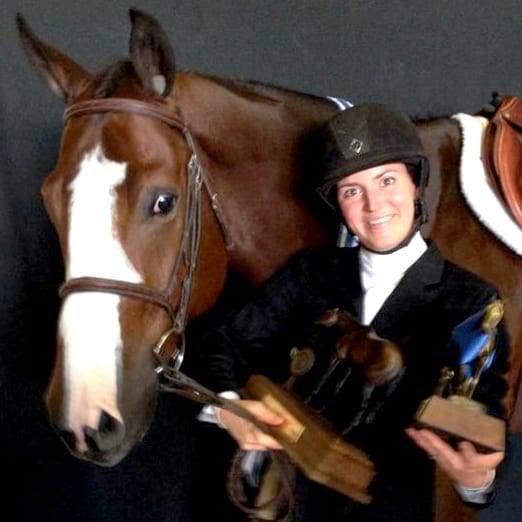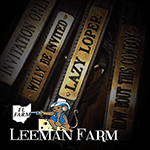GoHorseShow.com is pleased to feature the final installment of Sarah Elder Chabot’s five-part series, Working It. An amateur exhibitor on the AQHA circuit, Chabot offers tips on how to make showing work on a limited budget, and her final article deals with maintaining mental focus. Chabot discusses her recent experience showing at the Congress and offers some great advice to mentally prepare for the major shows–perfect timing for the AQHA World Show. Make sure to check out her other articles below in case you missed them! ================================
“Take a deep breath…You can do this” are the last words my trainer Karen speaks to me before I head into the coliseum at the All-American Quarter Horse Congress. Just an hour before my thoughts had been racing, “Did I bring my horse down to the arena too soon?”, “What if I don’t get to the first fence in a good spot?”, “ What if he ticks the pole?”, “What if someone runs into us in the warm up?”, What if? What if? What if? And the biggest nag that I had in my head was, “What if I don’t do my part to make us successful?”
As with any competitor, self-doubt is one of my biggest hurdles. After years of competing and not reaching my goals, and maybe getting in there a time or two, I get this weird mix of feelings knowing that on one hand I have the skills to do what it takes to win, but on the other I not only haven’t proven to everyone else that I can do this, but I haven’t even proven it to myself. I read once that the great hunter legend and Olympic Gold Medalist George Morris recognizes five ingredients in being a great rider – first was ambition, and coming in second was emotion along with the ability to recognize your emotion and be able to control it. If there were ever a test for my emotion, the 2013 Congress would have been it.
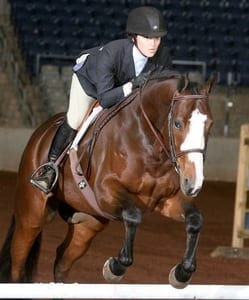 This year’s Congress was a rollercoaster ride for Calvin and me. We got to the show a day earlier to settle in. I woke up at 5:30 the next morning, because I was so excited to be there. We longed a little, rode a bit, and then rested. Calvin took in everything like a gentleman and while you always wonder how horses will react to such an active show, I knew Calvin was very level headed and shouldn’t have a problem. Friday night, I rode in the Celeste without any troubles – although the lazy pony didn’t want to go away from the gate.
This year’s Congress was a rollercoaster ride for Calvin and me. We got to the show a day earlier to settle in. I woke up at 5:30 the next morning, because I was so excited to be there. We longed a little, rode a bit, and then rested. Calvin took in everything like a gentleman and while you always wonder how horses will react to such an active show, I knew Calvin was very level headed and shouldn’t have a problem. Friday night, I rode in the Celeste without any troubles – although the lazy pony didn’t want to go away from the gate.
Saturday morning came, and we had our warm up trip in the Celeste, and that’s where things changed. Something about the Celeste that morning awoke a horse that I didn’t recognize. Calvin was a bit spooked; we got around the warm up with one peek at the fences, so I wasn’t too worried. Then, Jessica Johnson, the AQHA professional that rides Calvin in the open classes took him in the three foot warm up. While Jessica rode him great, Calvin was having none of it. And now my confidence was starting to crack. I spent the better part of Saturday evening/morning in the Celeste until Calvin came to an understanding with the arena.
Sunday morning came, and Jessica rode Calvin great picking up a sixth in the Junior Working Hunter and giving me some of my confidence back. But in the back of my mind, my horse that had always been a “Steady Eddie” in show arena now had shown that there was something that could bother him. We warmed up the night before during the hack, and he was great. But the thought of going into the show arena and having something happen was creeping more to the front of my mind.
After years of competing, I knew those thoughts weren’t going to help me at all. My horse had warmed up great, over the past year he has been a trooper, I cannot let one “off day” break my focus.
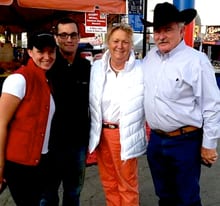 As I am standing in the tent waiting to go in, I am taking a lot of deep breaths and hear the words of my support team. Karen, “You can do this!” My mom, “Ride like you know how.” My husband, “I love you!” In my head, I keep going over the ride I want to have in the arena. In the final moments before entering, the gate steward tells me to wait until I get a nod from the judges. My plan was changing, but for the better. I knew Calvin liked to slowly walk into any arena…and he did. All the worry and self-doubt vanished. I pushed out all thoughts, but what I had to do. I see the judges ask for the canter and off we go. COUNT. 1, 2, 3, 4…. Just like at home. I round the corner, and think “Don’t pull”, I see my distance and ride to the first fence. He carries us down the line and to the second fence. We land on the correct lead, round the corner and stop. I look up and see the familiar faces of a friend’s parents, and they give me the thumbs up. Whew. I knew I had a decent trip.
As I am standing in the tent waiting to go in, I am taking a lot of deep breaths and hear the words of my support team. Karen, “You can do this!” My mom, “Ride like you know how.” My husband, “I love you!” In my head, I keep going over the ride I want to have in the arena. In the final moments before entering, the gate steward tells me to wait until I get a nod from the judges. My plan was changing, but for the better. I knew Calvin liked to slowly walk into any arena…and he did. All the worry and self-doubt vanished. I pushed out all thoughts, but what I had to do. I see the judges ask for the canter and off we go. COUNT. 1, 2, 3, 4…. Just like at home. I round the corner, and think “Don’t pull”, I see my distance and ride to the first fence. He carries us down the line and to the second fence. We land on the correct lead, round the corner and stop. I look up and see the familiar faces of a friend’s parents, and they give me the thumbs up. Whew. I knew I had a decent trip.
Karen meets me outside and we await the callbacks. We made it back and are invited back in for the rail work. I say to Karen, “The hard part is over!” She laughs and knows that didn’t used to be the case for my old horses. But with Calvin, I knew that he was honest on the rail, and I had confidence he would be good. We head in the pen at the trot, and after one trip, we settle into a comfortable pace. Now my focus was on ring position. I have ridden with a lot of these horses before, so I knew the rider and horse combinations that were longer-stepped or slower loping horses. As luck had it, two big rail positions came available, and Calvin and I settled in and made the most of our ride.
As I sat in the line up, I thought to myself, “I am going to work on my canter, so I can come back and win this.” I read somewhere that great athletes like Peyton Manning and Michael Jordan know the instant they make a mistake in a performance. They are so focused on every detail of a throw or catch the millisecond something is amiss they know what mistake has happened. I am far from that sort of insight, but I knew walking into the line up where I had excelled and what I need to improve.
At the Congress, I love how they do the placings under each individual judge first, and I couldn’t believe my ears when they called me out first under the first judge. And then second under the next. I couldn’t believe it. I got a sixth under the next and because I haven’t been in this position much, I really had no idea how they averaged the final placings. Another first under the last judge, and my mind went blank. I lined up at the far end of the arena beside Morgan Parisek, friend and fellow competitor for comfort.
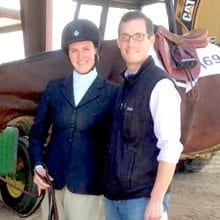 Within 15 minutes, I was left at the end of the arena with Samantha Roper – Multiple AQHA World Champion and Congress Champion. As she started walking towards the awards, I couldn’t believe it. The rest of the afternoon was mixed with phone calls, texts, tears, pictures all in a blur. I have been going hard at showing for the last 20 years, and this was my first time in this position.
Within 15 minutes, I was left at the end of the arena with Samantha Roper – Multiple AQHA World Champion and Congress Champion. As she started walking towards the awards, I couldn’t believe it. The rest of the afternoon was mixed with phone calls, texts, tears, pictures all in a blur. I have been going hard at showing for the last 20 years, and this was my first time in this position.
My husband and I reminisced about the ride later that night. I remarked about how I was surprised at how nervous I was before the class, but then as I stepped in the pen I sort of fell into doing the job at hand and focused. He asked me how I prepare mentally, and I got to thinking about what I always do.
- Know that there is always another show and another Congress.
- Create a routine – I do the same thing every time, same order of tacking up and getting ready. I find comfort in knowing that everything is in its place.
- Don’t let people into my bubble – There are always those that want to chat – some to work through their own nerves and others are savvy competitors that can get you off your came. I don’t try to be rude, but I do create a bubble for myself and only allow those that I know are positive and not distracting. I learned this from Karen Mundy, and since then it has really changed the way I prepare. This includes leaving your phone at the stalls. Text messages and Facebook posts can be just as distracting.
- Take a deep breath – As a long time and successful Amateur competitor turned professional, Karen Evans Mundy has been in almost every circumstance of nerves and she has a ton of tricks of relaxing and focusing. One tip is to hold your breath and let it out really slowly…until it hurts. This works… trust me!
- Get to the arena earlier than expected, that way if you forget something or need to settle in there is enough time to take care of everything without being rushed and rattled.
- Don’t look for people in the stands (except for your coach or trainer). I don’t look for my parents, husband, or even try to recognize anyone. I try to simply think only about the ride.
- Ride like you know how – Great advice from my mom, don’t change something because another competitor did it one way or the other, but be confident in your program and your trip. Then if you need to make a change to your style or prep in order to be more competitive …do it before the next show.
I don’t have the all the answers for mental focus, nor the best track record, but I do know that it is an important element on the road to winning. I am a constant student of trying to improve my riding skills, but I am also an avid reader of self-help articles, great quotes, and pieces on athletic performances. When all the preparation and focus come together for a great ride, the winning is always sweeter.
About Sarah Elder Chabot:
Competing on the AQHA circuit for more than 20 years, Sarah Elder Chabot has grown up showing American Quarter Horses in all classes from the hunter ring to the roping pen. With a diverse background in showing, Sarah is also a past contributor for the American Quarter Horse Journal, GoHorseShow.com and other equine publications. She currently competes on her horse, A Well Dressed Man, in amateur hunter classes, and can be seen traveling around with her favorite companion Elise, an Irish Jack Russell and her ever supportive husband, Andy. Outside of showing horses, you may see Sarah putting in a quick run, traveling to far off lands, and tasting great wine–all a part of her day job!


